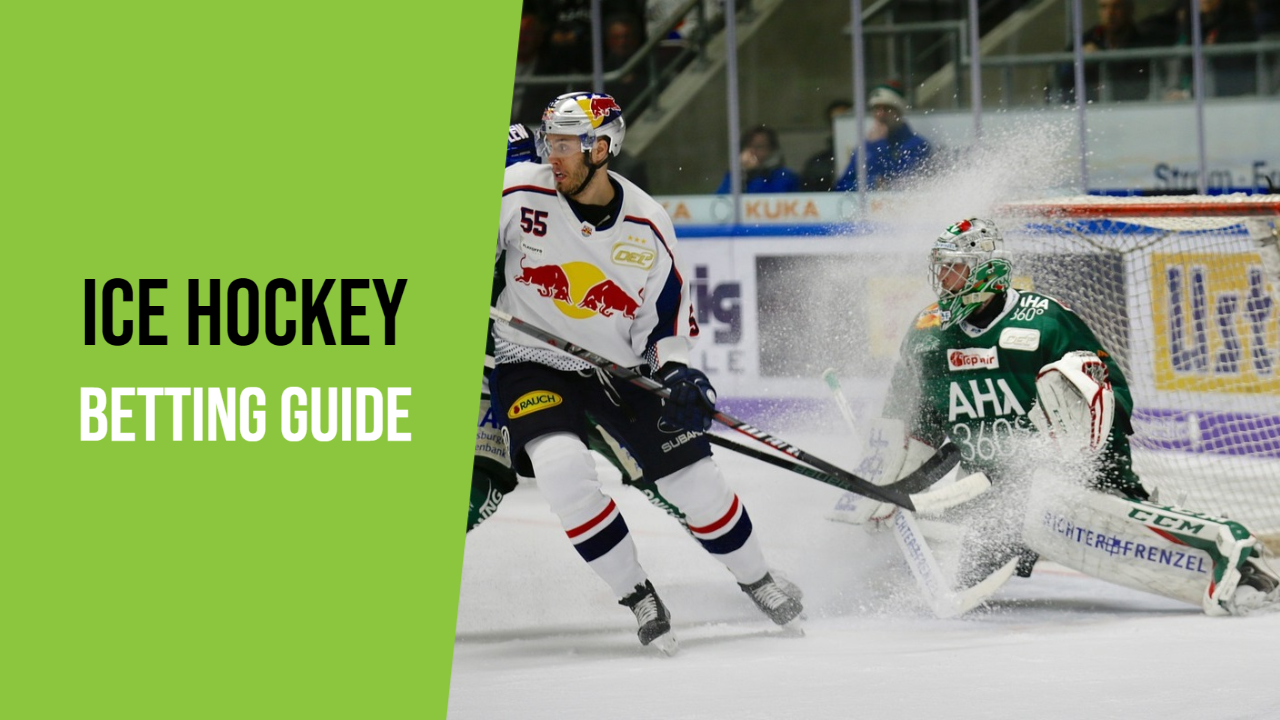
This Ice Hockey betting guide provides key insights into the sport and the factors that influence match outcomes. You’ll also discover trusted sites for hockey statistics and analysis, helping you make smarter, more informed betting decisions across domestic leagues and international competitions.
About Ice Hockey Betting
Ice hockey betting revolves around predicting match outcomes, goal totals, player stats, and long-term results across domestic leagues and international competitions. The most common markets include moneyline (match winner), puck line (spread betting), over/under goals, and tournament outrights.
While the NHL is the most prominent league — especially in North America — ice hockey also enjoys strong popularity in Europe and Russia. Key leagues include the Swedish Hockey League (SHL), Kontinental Hockey League (KHL), Liiga in Finland, and Czech Extraliga. Major international events such as the Winter Olympics and IIHF World Championship also provide prime betting opportunities.
Why Bet On Ice Hockey?
-
Fast-Paced Action
Hockey features non-stop movement, end-to-end transitions, and physical intensity — making it ideal for in-play betting and momentum-based analysis.
-
High Scoring Volatility
Small margins and quick goals can swing games rapidly. This creates frequent opportunities for value — particularly in live over/under and next-goal markets.
-
Lengthy Season
The NHL regular season runs from October to April, followed by playoffs that extend into June. Other leagues and international events fill the calendar year-round.
-
Global Tournaments
Events like the IIHF World Championship, Winter Olympics, and World Juniors attract international betting interest, offering fresh angles outside of club competitions.
-
Diverse Betting Markets
From regulation-time betting and puck lines to player props like goals, assists, or shots — hockey offers more market variety than many punters expect.
Popular Ice Hockey Competitions
These are the top ice hockey events that drive betting activity year-round across domestic leagues and international tournaments:
- National Hockey League (NHL): The world’s premier ice hockey league, featuring 32 teams from the US and Canada. Known for elite skill, fierce rivalries, and one of sport’s most intense playoff formats.
- Winter Olympics: Held every four years, the Olympic hockey tournaments bring together top national teams and create huge interest — especially when NHL players are involved.
- IIHF World Championship: A major annual international tournament featuring national teams from around the world. Popular with European fans and ideal for spotting value on rising stars.
- Kontinental Hockey League (KHL): The strongest league outside North America, with teams from Russia, Finland, Kazakhstan and beyond. A key market for mid-season betting and alternative league exposure.
- NCAA Men’s Ice Hockey Championship: A fast-paced US college tournament showcasing future NHL talent. Great for underdog value and lively knockout betting.
Best Bookmakers for Ice Hockey Betting
I recommend the following bookmakers for placing ice hockey bets:
#ad ● 18+ ● Play Safe ● GambleAware.org
#ad ● 18+ ● Play Safe ● GambleAware.org
#ad ● 18+ ● Play Safe ● GambleAware.org
#ad ● 18+ ● Play Safe ● GambleAware.org
#ad ● 18+ ● Play Safe ● GambleAware.org
#ad ● 18+ ● Play Safe ● GambleAware.org
New UK customers. Min £10 first deposit. Place a bet of £10 at min odds of 2.0 and get £40 in Free Bets within 48 hours. Restrictions apply. Full T&Cs apply, 18+. BeGambleAware.org
#ad ● 18+ ● Play Safe ● GambleAware.org
#ad ● 18+ ● Play Safe ● GambleAware.org
#ad ● 18+ ● Play Safe ● GambleAware.org
#ad ● 18+ ● Play Safe ● GambleAware.org
Considerations for Ice Hockey Betting
Ice hockey is one of the fastest and most physical team sports — with unpredictable scoring swings, rapid momentum shifts, and complex tactics. Successful betting requires more than just knowing the standings; you need to understand what drives outcomes on the ice. Below are the key factors to consider when betting on ice hockey:
Physical Demands
Hockey is intense and relentless — players sprint, stop, check, and recover in quick succession. Teams that lack conditioning often fade in the final period. Consider:
- Stamina & Shift Length: Fatigued teams often concede late goals. Look at recent schedules — back-to-back games can impact energy levels.
- Speed & Agility: Quick, mobile teams often dominate puck possession — especially on larger international rinks.
- Injury Resistance: Fit squads are more consistent across a long season. Star injuries can drastically shift match odds and total goal markets.
Team Strategy
Hockey is highly tactical. Coaches rotate lines, adjust pressure, and manage the game minute by minute. Strategic mismatches can decide outcomes:
- Forechecking Style: Aggressive forechecking teams force turnovers and create scoring chances — valuable in first-period or early goal markets.
- Defensive Systems: Trap systems limit high-danger shots and keep scores low — favouring unders and low-margin outcomes.
- Special Teams: Power play and penalty kill efficiency directly impact totals and goal-scorer props. Check recent conversion and kill percentages.
- Line Matching: Home teams with the last change can neutralise star players by deploying shutdown lines — important in elite matchups or playoffs.
Player Skill & Form
Individual brilliance can swing games — especially in tightly matched contests. When assessing team strength, consider:
- Offensive Talent: Elite scorers convert more chances and often determine player prop outcomes (e.g. anytime goal or shot totals).
- Puck Possession: High-skill teams dominate time on the puck, reducing opponent opportunities and driving up shot volume.
- Goaltending: A hot goalie can steal games or keep scores low. Always check recent save percentage, especially against top opponents.
Team Chemistry
Hockey lines (forward trios and defence pairings) are built around chemistry. Disruptions to these combinations — due to trades, injuries, or form — can affect performance:
- Line Consistency: Stable lines often outperform chopped-up ones. Changes mid-season can create short-term uncertainty.
- Role Balance: Teams need scorers, enforcers, playmakers, and shutdown defenders. Imbalance affects puck control and goal differential.
- Mental Resilience: Watch for streaky teams. Some squads bounce back from losses; others spiral — useful for betting trends or bounce-back spots.
Rules & Officiating
Ice hockey rules impact tempo, scoring, and tactics. Penalty frequency, officiating consistency, and overtime formats can all sway markets:
- Penalty Trends: Some refs call tight games, others let things go. High-penalty matches boost power play scoring and increase overs.
- Three-on-Three Overtime: NHL games tied after regulation go to 3v3 OT — a chaotic format favouring quick, skilled players.
- Empty Net Dynamics: Late-game strategies (pulling the goalie) can affect totals and last-goal markets. Track team tendencies.
Situational Scheduling
Fatigue, travel, and motivation matter — especially in long seasons or road trips:
- Back-to-Backs: Teams playing on consecutive nights often underperform — particularly if they travel between games.
- Home vs Away Splits: Some teams thrive at home but struggle on the road. Others travel well due to altitude or system play.
- Playoff Positioning: Motivation differs late in the season. Playoff-bound teams may rest stars, while bubble teams push harder.
Ice Hockey Betting Markets
Ice hockey offers a variety of betting markets — from classic match outcomes to player props and futures. Here are the most common options available:
- Match Winner (Moneyline): A straight bet on which team will win the game. In NHL betting, this often includes overtime and shootouts unless otherwise specified.
- Puck Line: A spread bet where the favourite typically starts at -1.5 goals. They must win by two or more goals for the bet to land, while the underdog covers if they win or lose by one.
- Total Goals (Over/Under): Wager on whether the combined number of goals in the game will be over or under a line set by the bookmaker — commonly 5.5 or 6.5 in the NHL.
- Period Betting: Bet on the result of a specific period (1st, 2nd, or 3rd), such as who wins the period or how many goals will be scored within it. Ideal for short-term momentum plays.
- Props (Specials): Bet on specific in-game occurrences, such as first goal scorer, total player shots, or whether a player will score a hat trick. Great for targeting individual form.
- Futures (Outrights): Long-term markets like betting on the Stanley Cup winner, division champion, or top goal scorer. Prices fluctuate throughout the season based on form and standings.
Best Sites for Ice Hockey Stats
The following websites provide high-quality, free statistics for ice hockey bettors and fans alike:
For a full breakdown of these platforms, check out: Best Sites For Ice Hockey Statistics
Ice Hockey FAQ
A fast-paced team sport played on ice, where two teams compete to score goals by hitting a puck into the opponent’s net using sticks. Each team typically has six players on the ice: three forwards, two defencemen, and a goaltender.
Players wear helmets, padded gloves, shoulder and elbow pads, shin guards, mouthguards, skates, and protective base layers. Goaltenders wear extra padding and a mask.
A power play occurs when one team has more players on the ice due to a penalty against the other team. It creates a temporary man-advantage and is a key scoring opportunity.
The defensive strategy used by the team that is short-handed during a power play. The goal is to survive the penalty time without conceding a goal.
The top eight teams from each conference qualify — three from each division, plus two wild cards. Teams play best-of-seven series across four rounds to determine the Stanley Cup champion. Playoff experience and seeding are often key in long-term betting markets.
Special teams refer to the units used during power plays and penalty kills — situations that arise when one or both teams are penalised. There are two types of special teams:
- Power Play – The team with the numerical advantage when an opponent has a player in the penalty box. Power plays create more space and increase the chance of scoring.
- Penalty Kill – The team playing short-handed due to a penalty. Their goal is to defend, block shots, and clear the puck until they return to full strength.
The Stanley Cup is the championship trophy awarded to the NHL playoff winners. It’s the most prestigious prize in professional ice hockey and has been contested since 1893.
- How Valuable Are Free Bets? Are They Worth It? - January 28, 2026
- MuchBetter | Gambling E-Wallet | Pros & Cons, Betting Sites - January 28, 2026
- How To Read Horse Racing Form | Beginner’s Quick & Easy Guide - January 27, 2026










